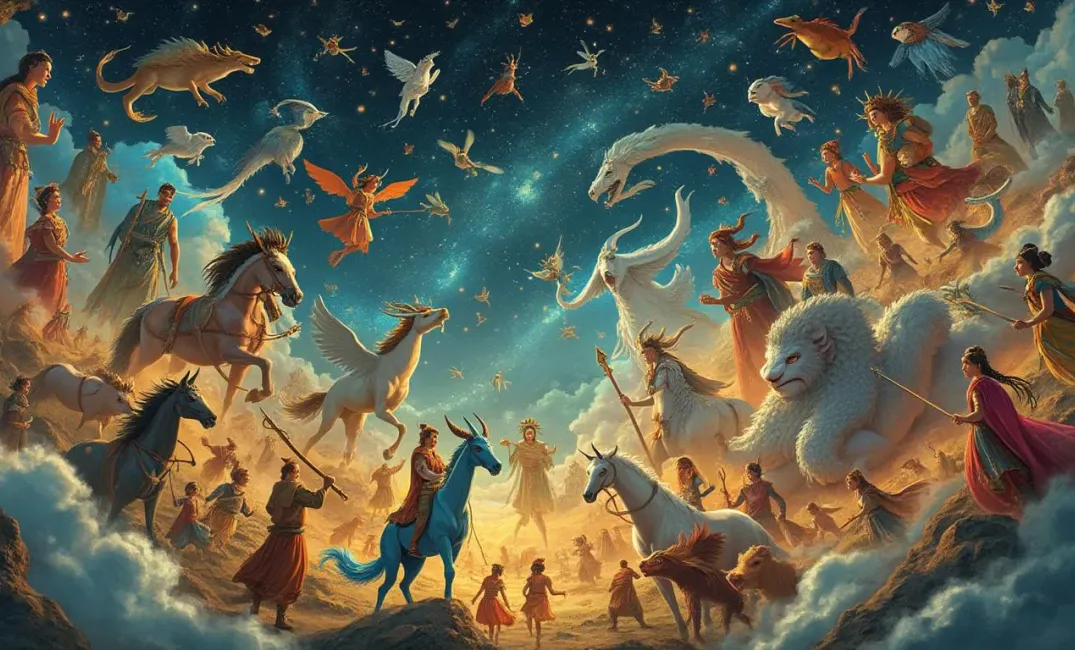Introduction: The Enduring Power of Myth
"Myths are public dreams, dreams are private myths." — Joseph Campbell
Humanity's fascination with myth and legend is as ancient as our curiosity about the stars. These narratives, passed down through generations, have profoundly influenced civilizations, offering explanations for natural phenomena, moral lessons, and glimpses into humanity’s deepest fears and desires. This entry explores the rich tapestry of myths and legends, their role in shaping history, culture, and individual identity, and their enduring legacy as a source of inspiration, reflection, and connection.
Origins of Myth: Foundations of Collective Identity
Early Myths and Oral Traditions
- Cosmic Origins and Creation Myths: From the Babylonian Enuma Elish to the Norse Yggdrasil, creation myths serve as foundational narratives for cultures, providing structure, explanation, and meaning in an unknowable world.
- Folklore and Heroic Epics: Stories of heroes like Gilgamesh, Beowulf, and the protagonists of the Mahabharata capture human virtues and flaws, imparting moral lessons and celebrating the human spirit's resilience and quest for greatness.
Allegory and Symbolism
- Natural Phenomena and Personification: Myths often personify elements of nature, explaining phenomena beyond human understanding. Thunder gods like Zeus, Thor, and Indra illustrate cultural perspectives on nature's power and caprice.
- Cultural Values and Morality: Myths encapsulate cultural norms and ethical frameworks, guiding behavior through allegory. Aesop's Fables and African Anansi tales illustrate values like wisdom, justice, and community through animal characters and moral dilemmas.
The Evolution of Myth: Interconnections and Transformations
The Classical Influence
- Greco-Roman Pantheon: The mythologies of ancient Greece and Rome, with gods embodying human characteristics and cosmic forces, have influenced art, literature, and philosophy for centuries, becoming archetypes of Western cultural heritage.
- Cultural Exchange and Synthesis: Mythological themes spread through trade, conquest, and cultural interaction, resulting in synthesized legends, such as the integration of Egyptian, Greek, and Roman deities during the Hellenistic period.
Medieval and Renaissance Myths
- Arthurian Legends and Chivalry: The tales of King Arthur and the Knights of the Round Table reflect medieval concepts of knighthood, honor, and courtly love, blending Celtic mythology with Christian elements to craft stories of adventure and virtue.
- Dante and the Divine Comedy: Symbolizing the transition from medieval to Renaissance worldviews, Dante’s epic journey through Hell, Purgatory, and Heaven reflects allegorical exploration of human sin, redemption, and divine justice.
Myth’s Role in Modern Society: Influence and Revival
Renaissance and Enlightenment
- Myth as Allegory: During these periods, mythological narratives were reinterpreted through art, literature, and philosophy, offering nuanced reflections of human experience, as seen in works like Botticelli's "The Birth of Venus" and Goethe's "Faust."
- Romanticism and National Identity: The Romantic era valorized folklore and myth as foundations of national identity and cultural uniqueness, leading to a revival in the interest in native tales and legends across Europe and beyond.
20th Century and Beyond
- Literary and Cinematic Inspirations: Myths continue to inspire creative works, from Tolkien's Middle-earth to Marvel's Asgard. These modern reinterpretations explore timeless themes of heroism, morality, and the struggle against darkness.
- Psychological and Philosophical Intersections: Theories like Carl Jung’s archetypes and Joseph Campbell’s monomyth highlight myths' enduring psychological significance, shaping narratives across cultures and influencing personal and collective consciousness.
The Universality of Myth: A Global Perspective
Cross-Cultural Themes
- The Hero’s Journey: Common patterns of adventure, struggle, and transformation find resonance across cultures, showcasing the universal human experience and collective wisdom within mythological frameworks.
- Duality and Balance: Myths often explore dichotomies like good versus evil, chaos versus order, and life versus death, reflecting humanity's attempts to understand and reconcile life's complexities.
Connectivity and Adaptation
- Myth in Diasporas: As cultures migrate and evolve, myths adapt, preserving core narratives while integrating new cultural contexts and experiences, illustrating resilience and continuity in changing societies.
- Digital Age and Global Dialogue: In today's interconnected world, myths travel farther, reaching new audiences and fostering global conversations about shared human experiences and values.
Conclusion: The Indestructible Legacy of Myth
"Myths are shared stories that belong to all the world and contain truths that resonate across time." — Unknown
Myths and legends are humanity’s oldest narratives, reflecting our universal desires and fears, bridging the gaps between past, present, and future. As long as there are stories to tell, myths will endure, inspiring generations with their imaginative power and timeless insights.
In an ever-evolving world, the legacy of myth offers solace and wisdom, reminding us of our shared heritage and potential. As humanity writes new chapters in the cosmic saga, myths remain as testament, guide, and muse, illuminating the path toward new horizons and deeper understanding. May the art of storytelling continue to enrich human experience, nurturing creativity and connection across the vast expanse of existence.
May these narratives long inspire the exploration of meaning and encourage the sharing of wisdom among civilizations, both ancient and those yet to unfold across the stars.
INSPIRATION, JOSEPH CAMPBELL, LEGENDS, CULTURE, TRANSFORMATION, MYTHOLOGY, NARRATIVE, HEROES, HISTORY, STORYTELLING

